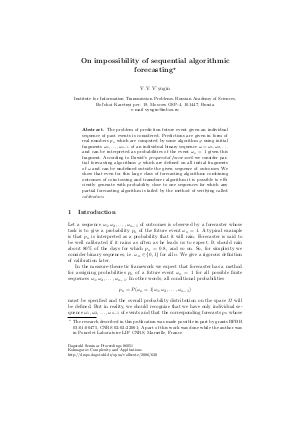On impossibility of sequential algorithmic forecasting
Author Vladimir V'Yugin
-
Part of:
Volume:
Dagstuhl Seminar Proceedings, Volume 6051
Part of: Series: Dagstuhl Seminar Proceedings (DagSemProc) - License:
 Creative Commons Attribution 4.0 International license
Creative Commons Attribution 4.0 International license
- Publication Date: 2006-07-31
File

PDF
DagSemProc.06051.11.pdf
- Filesize: 205 kB
- 7 pages
Document Identifiers
Subject Classification
Keywords
- Universal forecasting
- computable calibration
- Dawid's prequential framework
- algorithmic randomness
- defensive forecasting
Metrics
- Access Statistics
-
Total Accesses (updated on a weekly basis)
0Document
0Metadata
Abstract
The problem of prediction future event given an individual
sequence of past events is considered. Predictions are given
in form of real numbers $p_n$ which are computed by some algorithm
$varphi$ using initial fragments $omega_1,dots, omega_{n-1}$
of an individual binary sequence $omega=omega_1,omega_2,dots$
and can be interpreted as probabilities of the event $omega_n=1$
given this fragment.
According to Dawid's {it prequential framework}
%we do not consider
%numbers $p_n$ as conditional probabilities generating by some
%overall probability distribution on the set of all possible events.
we consider partial forecasting algorithms $varphi$ which are
defined on all initial fragments of $omega$ and can
be undefined outside the given sequence of outcomes.
We show that even for this large class of forecasting algorithms
combining outcomes of coin-tossing and transducer algorithm
it is possible to efficiently generate with probability close
to one sequences
for which any partial forecasting algorithm is failed by the
method of verifying called {it calibration}.
Cite As Get BibTex
Vladimir V'Yugin. On impossibility of sequential algorithmic forecasting. In Kolmogorov Complexity and Applications. Dagstuhl Seminar Proceedings, Volume 6051, pp. 1-7, Schloss Dagstuhl – Leibniz-Zentrum für Informatik (2006)
https://doi.org/10.4230/DagSemProc.06051.11
BibTex
@InProceedings{vyugin:DagSemProc.06051.11,
author = {V'Yugin, Vladimir},
title = {{On impossibility of sequential algorithmic forecasting}},
booktitle = {Kolmogorov Complexity and Applications},
pages = {1--7},
series = {Dagstuhl Seminar Proceedings (DagSemProc)},
ISSN = {1862-4405},
year = {2006},
volume = {6051},
editor = {Marcus Hutter and Wolfgang Merkle and Paul M.B. Vitanyi},
publisher = {Schloss Dagstuhl -- Leibniz-Zentrum f{\"u}r Informatik},
address = {Dagstuhl, Germany},
URL = {https://drops.dagstuhl.de/entities/document/10.4230/DagSemProc.06051.11},
URN = {urn:nbn:de:0030-drops-6305},
doi = {10.4230/DagSemProc.06051.11},
annote = {Keywords: Universal forecasting, computable calibration, Dawid's prequential framework, algorithmic randomness, defensive forecasting}
}
